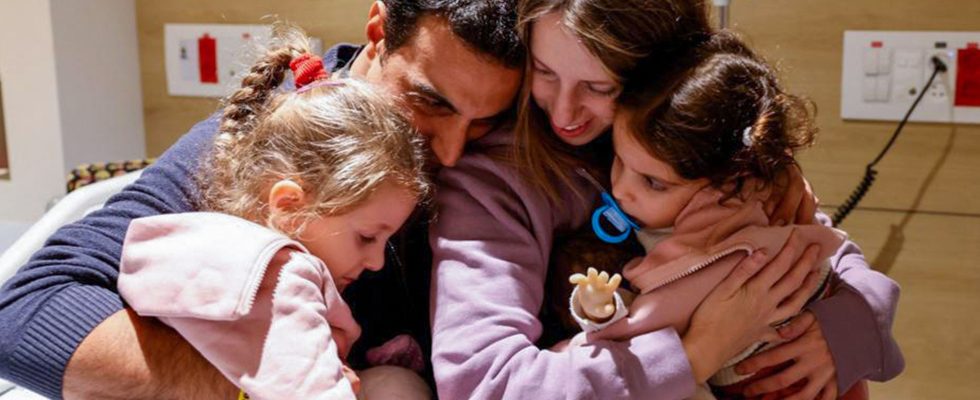The release of hostages from the October 7 attacks began slowly as part of the agreement between Israel and Hamas. Friday, November 24, a first group of 24 hostages was released, including 13 Israelis, followed by a second the next day, made up of 17 people, primarily mothers with their children and elderly people.
Handed over by Hamas to the International Committee of the Red Cross (ICRC) at the Rafah crossing point in Egypt, the Israeli nationals were received and transported by helicopters or military ambulances to different hospitals, from where they follow a protocol strict medical, after nearly fifty days spent in captivity, details i24news.
According to a press release from Schneider Children’s Hospital, where the first released mothers were received with their children, “doctors carried out a preliminary examination and found that they were all in good physical condition.” Five hostages, elderly women, were transferred to another hospital, Wolfson Hospital in Holon, which says some are “weak and exhausted” and remained under observation, reports the Times of Israel.
Medical and psychological care
These releases were anticipated and prepared by the Israeli Ministry of Health. “We have trained and are ready to face all types of scenarios,” said the ministry’s director general, Moshe Bar Siman-Tov, during a press conference forty-eight hours before the start of the truce, detailing the different stages of the process which would accompany the return of the hostages, always according to the Times of Israel.
After an initial examination, the hostages will be sent to one of six Israeli hospitals, where the hostage’s medical records collected over the past few weeks will be sent. “From a medical point of view, the doctor will first ask if they have no pain. I spoke with hostages and some have, for example, gastroenteritis. We must check that they do not have any pain. “have no specific medical problem and do physical examinations,” explains Hagai Levine, head of the medical team at the Hostage Families Forum, according to comments reported by BFMTV. “The healing is both physical and mental. They need to be with their family to recover,” he adds.
Identify “any sign of torture or rape”
According to information released by the Ministry of Health, each hostage or family will be assigned a social worker, psychologist or psychiatrist if necessary, to assess and treat them. The military is also advised that only one soldier accompanies each family or child to facilitate the process. “The soldiers must identify themselves and speak reassuringly to the child, while taking care not to take his hand or carry him, unless he consents,” details the Times. They are advised not to answer questions from children who ask for news of their parents if the latter have died, before they return to their families.
Concerning adults, some may not want to be touched, be sensitive to light if they have been held underground, or even to certain sounds. The Health Ministry also asked doctors to look for and document “any signs of torture, rape or other war crimes.” Another element which could prove traumatic: the hostages are probably not aware of the scale of the attacks, do not know whether or not they have lost loved ones and are not aware of the situation in the country.
Visit information
In order not to disrupt the return process, the ex-hostages will be received in separate spaces in each hospital, away from other patients, the public and the press. After a series of medical examinations, they will continue to be monitored medically and psychologically.
The Israeli intelligence services will subsequently meet them “when they feel ready”, according to i24news. Children should not be questioned so as not to aggravate their trauma. As for the hostages who have not been released during the four days of truce, the agreement reached with Hamas must allow the Red Cross to visit them and provide them with medicine.
